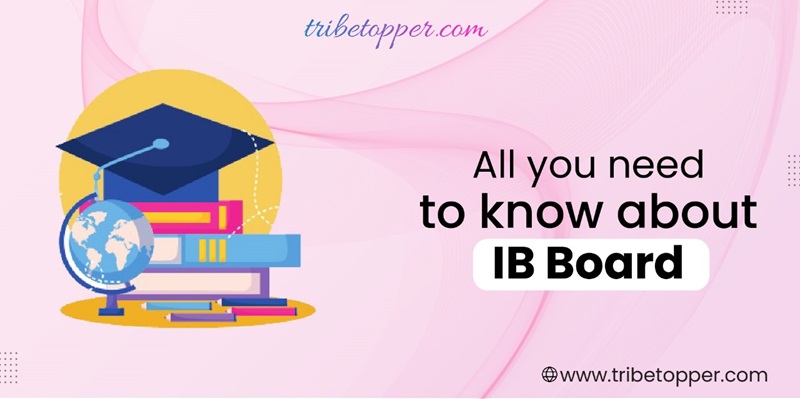All You Need To Know About IB Board

Today, there are several board options available for students to consider for their careers. This is why the question often arises: where should I take admission? How many education boards are there in India? Is the IB board the best? Will the IB board help in fulfilling your dream of studying abroad?
The field of education has always been constantly evolving. As a result, pupils have a lot of options to choose from. Such questions must be in the minds of many of you. Parents of kids in India need to choose an appropriate education board. The kind of exposure offered, the curriculum to be followed to, and how each education board applies the curriculum. Each of these is important for both career and personality development.
Yes! It means if you study at IB board, there are chances as much higher that you will have global exposure. So, let’s look over here –
What is the IB Board?
The board provides world-class education to students with practical, lifelong learning experiences. The IB is governed by an elected Board of Governors, which chooses and appoints the CEO, sets the organization’s strategy and set of policies, oversees financial management, and ensures the integrity and sovereignty of student assessment. The board further includes –
- A student-centred approach to learning.
- Provides continuing education for children aged between 3 to 19 years.
- Aims for the comprehensive development of students.
- Provide a reliable and consistent base for development.
- Add a flexible environment and curriculum designed to address and educate students according to their culture and context.
- Be prepared to face everyday challenges with an open and positive mindset.
Syllabus/Curriculum of IB Board –
The IB board offers four different programs, namely the Primary School Program (PYP), the Middle School Program (MYP), the Diploma Program (DP), and the Career Development Program (CP). The main examinations administered annually by the IB board for the Bachelor’s degree are the Diploma program and Career Development Program. The exams are held in two different sessions, one in November and the other one in May.
Difference between IB and IGCSE board –
Some of the critical pointers for differentiating between IB and IGCSE boards are –
The International Baccalaureate IB and the International General Certificate of Secondary Education IGCSE are two different international school education programs. The IGCSE is also an examination body.
The IGCSE is headed by a division of the University of Cambridge, while the IB is an educational foundation headquarters in Geneva.
The IB board prescribes an education structure, while Cambridge offers a pre-defined curriculum.
IB program must be implemented by school administrators and teachers who are familiar with the framework and have a solid understanding of the curriculum requirements focused on the target skills in each subject.
IGCSE offers curriculum guidelines, while the IB board gives schools that host its program the freedom to design and implement the curriculum. A well-developed curriculum by the schools must meet the assessment criteria prescribed by the IB, including scientific knowledge, communication, scientific inquiry, etc.
What is the difference between ICSE and IB board?
Wondering how ICSE is different from the IB board? Here are the important pointers that distinguish these two boards:
| Differences based on: | ICSE Board | IB Board |
| Curriculum | The board primarily follows the Indian curriculum, offering a comprehensive study of subjects. | This board is globally focused on encouraging an international perspective across subjects. |
| Assessment | Mainly emphasis on a final board exam at the end of the academic year. | Utilizes a blend of internal and external assessments, including coursework and exams. |
| Recognition | It is specifically recognized in India and some international schools. | Globally recognized focuses on international standards and global university recognition. |
| Teaching approach | Generally, follows traditional teaching methods, emphasizing depth of knowledge. | Emphasizes critical thinking, creativity, and a holistic approach to learning. |
| Flexibility | Offers some subject choices within a pre-defined framework. | Provides a more flexible curriculum, allowing students to choose subjects of their interests. |
| Grade System | Typically uses a numerical grading system | Uses a 7 point grading scale. |
| Languages | Students may need to study the regional language. | The study of a variety of languages, including the options for a student’s mother tongue. |
Top IB board schools in India –
Now that you know everything about the IB board, the next step is to choose the right school. Here’re listed the best schools in India –
- Ahmedabad International School
- American Embassy School, Delhi
- American School of Bombay, Mumbai
- Canadian International School, Bangalore
- Dhirubhai Ambani International School, Mumbai
- Ecole Mondiale World School, Mumbai
- Mahatma Gandhi International School, Ahmedabad
- Oakridge International School, Hyderabad
Wrapping up –
We hope this article helped you get complete knowledge about the IB board. The board can be challenging, but it can be rewarding in many terms. Whether you’re a scholar or someone who struggles with academics, the key to success is never to give up and always keep pushing forward. Remember that exams are just a tiny part of the bigger picture, and that’s your worth, not your grades. So, please take a deep breath, stay focused, and give it your best shot this time.
Author Bio –
Sonal Gupta, a professor specializing in the International Baccalaureate IB curriculum, brings a wealth of knowledge about the IB board through this article. She has dedicated 25 years of experience in academics. Known for dynamic teaching methods and a passion for inspiring students, Sonal Gupta is a respected figure in the field.